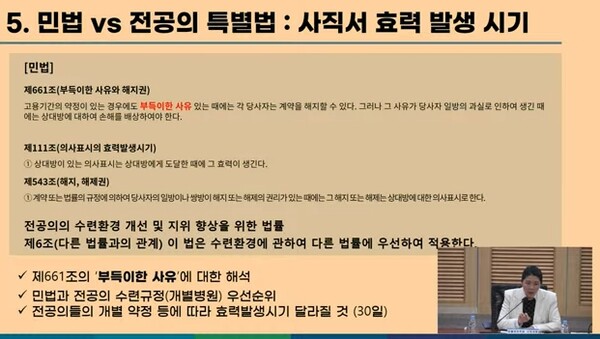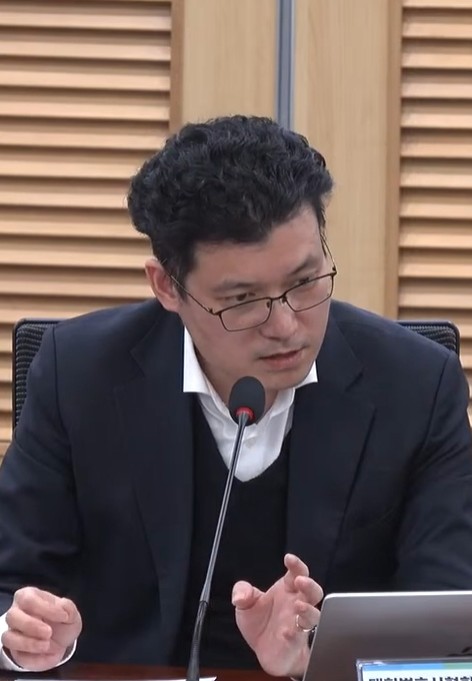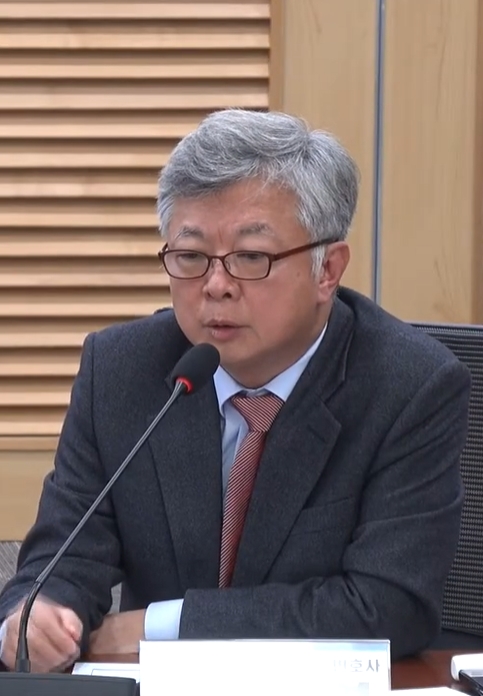Legal experts debated the effective timing of trainee physicians' resignation letters at a meeting convened by Rep. Shin Hyun-young of the Democratic Party of Korea, titled "How to interpret the legal issues related to the medical crisis," held at the National Assembly on Thursday.

Recently, the government sent an order to the heads of medical institutions not to accept resignation letters from interns and residents.
Lawyer Lee Min, a member of the Human Rights Committee at the Korean Bar Association, said that the resignation becomes effective when the hospital heads accept it.

"If there is an ‘inevitable reason’ as specified in Article 661 of the Civil Code, a resignation letter may be effective depending on individual agreements,” Lee said. “However, in principle, resignation occurs when an intention to resign is made and accepted." When judging whether an unavoidable reason can be recognized as an exception, it can only be referred back to whether it is “justified,”' Lee said. If it goes to court, he added that the trainee doctor (who submitted the resignation letter) must prove that it has taken effect with reasons and evidence.
On the other hand, lawyer Lim Moo-young of Lim Moo-young Law Firm said, "The employment contract signed by junior doctors with hospitals falls under Article 661 of the Civil Code, which states that they can terminate the contract for 'unavoidable reasons.’”

Lim said that if trainee doctors express their intention to terminate contacts by submitting resignation letters according to Articles 111 Paragraph 1 and Article 543 of the Civil Code, which govern the effectiveness of contract termination, the letters go into effect on the day the trainee doctors tender their resignation.
Regarding “unavoidable reasons” that may be controversial, Lim made a broader interpretation."If trainee doctors claim that they have realized that they have no future even if they win license as specialists by grinding their bones and cite such realization as the ‘inevitable reason,’ the contract termination will be recognized,” Lim said.
Concerning the government’s order on hospital heads not to accept resignation letters, Lim said that the hospital has no authority to refuse to accept them because the doctor is free to submit them.
He added, “A government order that prevents the hospital from accepting the resignation letter is likely to be interpreted as an abuse of power."
Lim also noted that the applicability of the government's order to maintain medical treatment or resume work may also depend on when the resignation letter is effective.
"Under Article 59 Paragraph 3 of the Medical Service Act, failure to comply with an order to open a practice is criminally punishable. To be such a target, however, there must be a business to be ordered to resume," Lim said. "In principle, doctors who have resigned from their positions and have no affiliation cannot be ordered to open a practice."
Furthermore, the government's order to resume work is not an order to work as a doctor but to return to the hospital where they were previously employed, so even if the order itself is legal, it is illegal in content, he said.
"The practice maintenance order itself is valid, but if you resign and say that you will quit, it is invalid," Lim said. "If medical residents do not fulfill the order, the minister of health and welfare can suspend their license for up to a year, but the practice maintenance order is not a 'no-resignation order,' so they can resign."
However, there were also opinions that the public's view of the mass resignation of doctors as a "strike" should be considered.
"It raises the ethical issue of sacrificing innocent patient health and lives and violates ethical guidelines, such as the Hippocratic Oath, which makes doctors a respected profession," said Lee, the KBA lawyer who judged doctors' collective resignations a "strike."
This is an area where public trust is lost. Lee pointed out that there is a general consensus on the need to maintain practice and the requirement to trigger an open practice order.
Others criticized the government for taking legal action against the junior doctors who resigned by issuing medical maintenance and business start-up orders.
"It was a problem that medical treatment was paralyzed just because the trainee doctors left the hospital," said Kim So-yoon, chair of the Korean Association of Medical Law. "The problem is not the junior doctors' responsibility but the medical situation itself."
Moreover, the administration announced the increase (the increase of the medical school enrollment quota by 2,000) even though they knew doctors would leave and were preparing for such a situation. It's as if the government encouraged them to leave, Kim said.
"The most unfortunate people are the patients and the public, and the next most unfortunate people are trainee doctors. I believe that the junior doctors have taken responsibility for the previous generation's faults, and the medical community and specialist doctors are being shouldered with responsibility for problems related to politics," Kim said.
Related articles
- Korean trainee doctors seek ILO's intervention against government's work order mandate
- 'Void of trainee doctors, Big 5 hospitals could suffer bankruptcies in a cascade'
- Exodus of medical residents forces neurological society to cancel workshop
- Medical professors at University of Ulsan unanimously decide to resign
- Nurses are filling in trainee doctors from today. Here’s what they can and can’t do.
- After exodus of trainee doctors, cash-short hospitals scramble to borrow money
- Med school professors sue health, education ministers to nix student quota hike
- [Contribution] Truth about medical professors’ resignations
- Seoul's ultimatum to trainee doctors: return to teaching hospitals or face de facto license revocation
- International women physicians condemn gender-biased remarks by Korean official
- Med school professors call for concessions but Seoul stands firm on increasing med school quota
- 350 delayed surgeries reported in 1 month after trainee doctors left hospitals
- Health Ministry issues public notice mandating return-to-work for 1,308 trainee doctors
- Professors from top Korean medical schools to resign en mass next Monday

